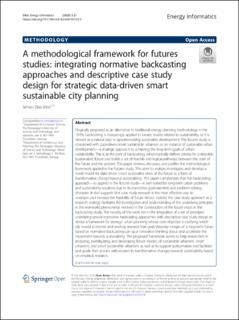| dc.contributor.author | Bibri, Simon Elias | |
| dc.date.accessioned | 2022-05-03T12:15:03Z | |
| dc.date.available | 2022-05-03T12:15:03Z | |
| dc.date.created | 2020-11-13T06:33:57Z | |
| dc.date.issued | 2020 | |
| dc.identifier.citation | Energy Informatics. 2020, 3 . | en_US |
| dc.identifier.issn | 2520-8942 | |
| dc.identifier.uri | https://hdl.handle.net/11250/2993926 | |
| dc.description.abstract | Originally proposed as an alternative to traditional energy planning methodology in the 1970s, backcasting is increasingly applied in futures studies related to sustainability, as it is viewed as a natural step in operationalizing sustainable development. This futures study is concerned with data-driven smart sustainable urbanism as an instance of sustainable urban development—a strategic approach to achieving the long-term goals of urban sustainability. This is at the core of backcasting, which typically defines criteria for a desirable (sustainable) future and builds a set of feasible and logical pathways between the state of the future and the present. This paper reviews, discusses, and justifies the methodological framework applied in the futures study. This aims to analyze, investigate, and develop a novel model for data-driven smart sustainable cities of the future as a form of transformative change towards sustainability. This paper corroborates that the backcasting approach—as applied in the futures study—is well-suited for long-term urban problems and sustainability solutions due to its normative, goal-oriented, and problem-solving character. It also suggests that case study research is the most effective way to underpin and increase the feasibility of future visions. Indeed, the case study approach as a research strategy facilitates the investigation and understanding of the underlying principles in the real-world phenomena involved in the construction of the future vision in the backcasting study. The novelty of this work lies in the integration of a set of principles underlying several normative backcasting approaches with descriptive case study design to devise a framework for strategic urban planning whose core objective is clarifying which city model is desired and working towards that goal. Visionary images of a long-term future based on normative backcasting can spur innovative thinking about and accelerate the movement towards sustainability. The proposed framework serves to help researchers in analyzing, investigating, and developing future models of sustainable urbanism, smart urbanism, and smart sustainable urbanism, as well as to support policymakers and facilitate and guide their actions with respect to transformative changes towards sustainability based on empirical research. | en_US |
| dc.language.iso | eng | en_US |
| dc.publisher | Springer | en_US |
| dc.rights | Navngivelse 4.0 Internasjonal | * |
| dc.rights.uri | http://creativecommons.org/licenses/by/4.0/deed.no | * |
| dc.title | A Methodological Framework for Futures Studies: Integrating Normative Backcasting and Descriptive Case Study for Strategic Data-Driven Smart Sustainable City Planning | en_US |
| dc.title.alternative | A Methodological Framework for Futures Studies: Integrating Normative Backcasting and Descriptive Case Study for Strategic Data-Driven Smart Sustainable City Planning | en_US |
| dc.type | Peer reviewed | en_US |
| dc.type | Journal article | en_US |
| dc.description.version | publishedVersion | en_US |
| dc.source.pagenumber | 42 | en_US |
| dc.source.volume | 3 | en_US |
| dc.source.journal | Energy Informatics | en_US |
| dc.identifier.doi | 10.1186/s42162-020-00133-5 | |
| dc.identifier.cristin | 1847580 | |
| cristin.ispublished | true | |
| cristin.fulltext | original | |
| cristin.qualitycode | 1 | |

